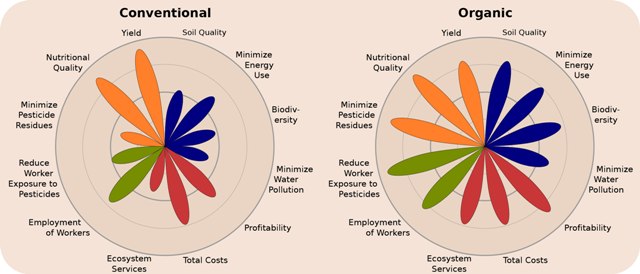Feb 5 2016
Washington State University researchers have concluded that feeding a growing global population with sustainability goals in mind is possible. Their review of hundreds of published studies provides evidence that organic farming can produce sufficient yields, be profitable for farmers, protect and improve the environment and be safer for farm workers.
 An assessment of organic farming relative to conventional farming illustrates that organic systems better balance the four areas of sustainability.
An assessment of organic farming relative to conventional farming illustrates that organic systems better balance the four areas of sustainability.
The review study, “Organic Agriculture in the 21st Century,” is featured as the cover story for the February issue of the journal Nature Plants and was authored by John Reganold, WSU regents professor of soil science and agroecology, and doctoral candidate Jonathan Wachter.
It is the first study to analyze 40 years of science comparing organic and conventional agriculture across the four goals of sustainability identified by the National Academy of Sciences: productivity, economics, environment and community well being.
“Hundreds of scientific studies now show that organic ag should play a role in feeding the world” said lead author Reganold (http://css.wsu.edu/people/faculty/john-p-reganold). “Thirty years ago, there were just a couple handfuls of studies comparing organic agriculture with conventional. In the last 15 years, these kinds of studies have skyrocketed.”
Organic production accounts for one percent of global agricultural land, despite rapid growth in the last two decades.
Critics have long argued that organic agriculture is inefficient, requiring more land to yield the same amount of food. The review paper describes cases where organic yields can be higher than conventional farming methods.
“In severe drought conditions, which are expected to increase with climate change, organic farms have the potential to produce high yields because of the higher water-holding capacity of organically farmed soils,” Reganold said.
However, even when yields may be lower, organic agriculture is more profitable for farmers because consumers are willing to pay more. Higher prices can be justified as a way to compensate farmers for providing ecosystem services and avoiding environmental damage or external costs.
Numerous studies in the review also prove the environmental benefits of organic production. Overall, organic farms tend to store more soil carbon, have better soil quality and reduce soil erosion. Organic agriculture creates less soil and water pollution and lower greenhouse gas emissions. And it’s more energy efficient because it doesn’t rely on synthetic fertilizers or pesticides.
It is also associated with greater biodiversity of plants, animals, insects and microbes as well as genetic diversity. Biodiversity increases the services that nature provides, like pollination, and improves the ability of farming systems to adapt to changing conditions.
Reganold said that feeding the world is not only a matter of yield but also requires examining food waste and the distribution of food.
“If you look at calorie production per capita we’re producing more than enough food for 7 billion people now, but we waste 30 to 40 percent of it,” he said. “It’s not just a matter of producing enough, but making agriculture environmentally friendly and making sure that food gets to those who need it.”
Reganold and Wachter suggest that no single type of farming can feed the world. Rather, what’s needed is a balance of systems, “a blend of organic and other innovative farming systems, including agroforestry, integrated farming, conservation agriculture, mixed crop/livestock and still undiscovered systems.”
Reganold and Wachter recommend policy changes to address the barriers that hinder the expansion of organic agriculture. Such hurdles include the costs of transitioning to organic certification, lack of access to labor and markets and lack of appropriate infrastructure for storing and transporting food. Legal and financial tools are necessary to encourage the adoption of innovative, sustainable farming practices.
Source: https://wsu.edu/